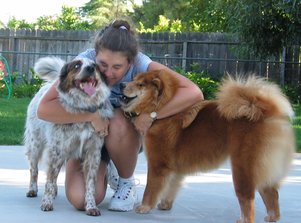How to Choose a Dog Trainer
Dog training is an unregulated industry — meaning that people without any education and training in animal behavior and learning can call themselves a “professional dog trainer” and proceed to do whatever they want to your dog, without having to disclose anything.

How this impacts dogs and the people who care for them can be profound: Many dogs are trained using techniques designed to scare and/or hurt the dog, which can cause unwanted side effects for some dogs. Research shows that motivating dogs with pain and fear causes some to become aggressive and some to become so scared that they simply shut down. And, sadly, some dogs can even suffer life-threatening or fatal injuries from training practices such as choking the dog, shocking the dog, and inflicting other types of pain onto the dog. It’s startling to imagine that these practices continue today, but they do.
So, finding a qualified dog trainer is serious business. It can mean the difference between you having a loving, trusting, happy, and fun relationship with your pup and one where your dog is mildly or truly afraid from the way he was trained.
Recommendations

Look for professionals who have received a comprehensive education in animal learning, dog behavior, and science-based non-aversive training methods. Graduates of The Academy for Dog Trainers, for example, undergo two years of rigorous testing and technical skill development to earn their certification.
One thing you’ll notice is that there are a LOT of initials after trainers’ names. You’ll know you’ve found an Academy for Dog Trainers graduate if you see “CTC” after their name. The Karen Pryor Academy is another excellent comprehensive program. Those graduates have the initials “KPA CTP” after their name.
One thing you’ll notice is that there are a LOT of initials after trainers’ names. You’ll know you’ve found an Academy for Dog Trainers graduate if you see “CTC” after their name. The Karen Pryor Academy is another excellent comprehensive program. Those graduates have the initials “KPA CTP” after their name.
We recommend that when you find a potential trainer, you check the trainer’s website (or email them directly, if it is unclear) to find out two things: First, ask if they use treats and toys to reinforce behavior. Good trainers will spend most of their time training using treats and toys. And second, if your dog is doing something you’d like him to stop doing, see if the trainer in question will either remove the things dogs like (think "time-out"), or teach an alternate behavior — both options are fine.
Avoid trainers who use unacceptable punishment techniques such as collar pops, a stern word, prong, choke, or shock collars.
Be sure to check the Pet Professional Guild's member directory to aid you in your research. Their membership is comprised only of force-free pet professionals.
Consumer Protection Statement: Client Beware!
As the Academy for Dog Trainers founder, Jean Donaldson, says in the following video, there is currently a lag between many trainers’ marketing language and actual practices. If a trainer advertises that he uses modern, evidenced-based, humane methods (“positive”), it might be true, or it might be false advertising.
To make sure you know how your dog will be treated (pardon the pun) by the trainer, ask:
- What exactly will happen to my dog when she gets it right?
- What exactly will happen to her when she gets it wrong?
- Are there any less invasive alternatives to what you propose.
For more information...
How to Choose a Dog Trainer by Zazie Todd, Ph.D., Companion Animal Psychology
All Dog Trainers Are Not Created Equal, DVM360.com
Dog Training's Dirty Little Secret: Anyone Can Legally Do It by Marc Bekoff, Ph.D., Psychology Today
All Dog Trainers Are Not Created Equal, DVM360.com
Dog Training's Dirty Little Secret: Anyone Can Legally Do It by Marc Bekoff, Ph.D., Psychology Today

